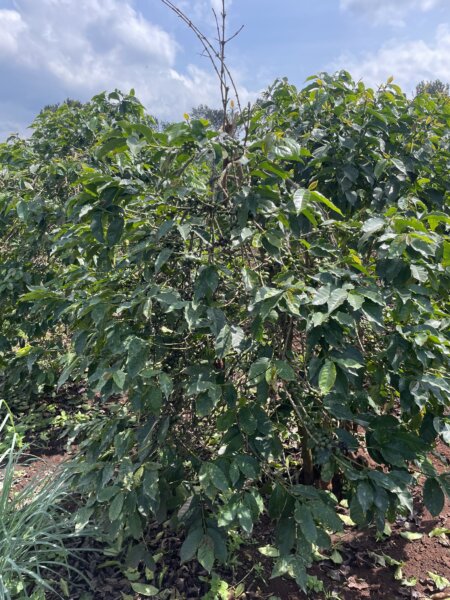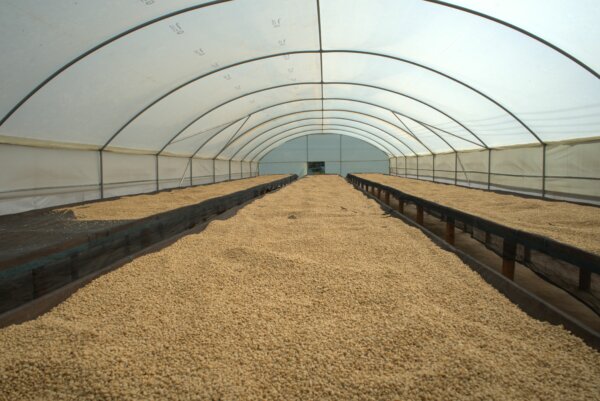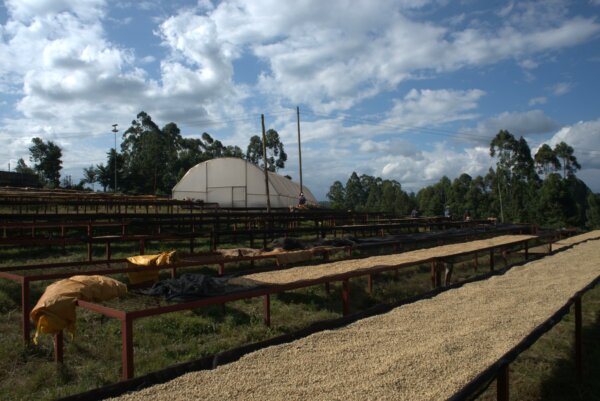About Karagoto AB
The Karagoto Factory is made up of smallholders with an average farm size of half a hectare. It has over 1,700 members supplying cherry. Karagoto is located in the Karatina region in Nyeri County, between the elegant Mount Kenya and the Aberdare range.
Karatina farms have 2 harvest seasons: the late crop running from late September to mid-January contributes about 70% of total annual production, and the early crop running from April to July contributes about 30%. This factory grows 95% SL 28 and SL 34 varieties, as well as 11% Ruiru and 1% Batian.
Harvesting is carried out by careful hand selection when the coffee cherries are perfectly ripe and is delivered same-day to the Karagoto wet mill. Karagoto carries out additional cherry sorting to ensure only the very best cherries are used. After pulping, the coffee is fermented overnight to break down the sugars before traveling through channels to the soaking tank where it’s carefully cleaned, soaked, and spread out on raised drying tables. Time on the drying tables depends on climate, ambient temperature, and total production volume undergoing processing. Drying can take from 13 to 14 days. Continuous sorting and hand turning of the parchment is key throughout the drying process.
In order to avoid environmental disruption, Karagoto’s wastewater soak pits are far from the fresh water source. Currently, the factory does not engage in wastewater treatment.
Karagoto is run by a factory manager who oversees all activities within the factory. Together with other staff members they carry out duties such as weighing coffee, selection, and grading of coffee, paying farmers, and addressing farmers’ issues.
To get to Karatina we first have to fly to Nairobi, and then travel via paved road for 3.5 hours. The coffee farms are very close to the washing station (20 minutes maximum), so farmers usually transport their coffee on motorbikes. Sometimes, the washing station hires a truck to go from farm to farm and collect coffee instead.
The Ngariama area has a long chain of mountains that help provide a diversity of altitudes and terrain for coffee cultivation. While this could seem like an obstacle to access (as it is in Peru where the presence of Andes means getting to a farm can take 7+ hours by road), in Ngariama the farms are only about a 20 minute trail walk (1-2 km) from the washing stations. Only in the rainy season does access become complex as mud makes these unpaved trails challenging to navigate.
In addition to coffee, common crops grown here are banana, maize, Grevillea, and macadamia trees, all of which are intercropped. Farms in this region are surrounded by forests of native trees where wild animals such as elephants and buffalos live. Local coffee producers use fences strategically along their farm perimeters to protect their crops and minimize contact with potentially dangerous fauna. The Kenyan government has prohibited logging and hunting in the area and producers are very respectful of these rules.
The predominant population are the Kikuyu, the oldest native population in the area which contains several tribes. Most people marry within their tribe. Everyone in the area speaks Kikuyu but the communities have small dialect differences.
The farms here are mostly very small (1-2 hectares) and adults work the farms while children attend school all day. Schools here cost money, which unfortunately limits access to education and future opportunities in this mostly-poor area. Due to lack of opportunity, much of the young population is migrating en masse to cities in search of better jobs, leaving their parents alone on the farms or even taking their parents and abandoning their farms. This problem gets worse each year. But some producers remain hopeful that coffee can provide good business opportunities for their children.






